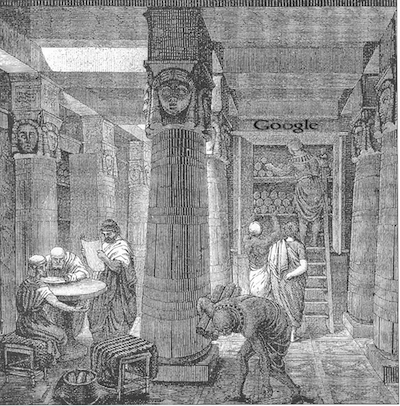 I first learned of the Great Library of Alexandria as a kid watching Carl Sagan talk about it on his show, Cosmos on my local PBS station. Like Sagan, I was greatly saddened by the story of its destruction and the great setback to human progress that represented. Books were my greatest treasure growing up, and their destruction was almost unthinkable.
I first learned of the Great Library of Alexandria as a kid watching Carl Sagan talk about it on his show, Cosmos on my local PBS station. Like Sagan, I was greatly saddened by the story of its destruction and the great setback to human progress that represented. Books were my greatest treasure growing up, and their destruction was almost unthinkable.
In the time of the Great Library, books were written on papyrus and copying one was a painstaking and time consuming, manual process. Today, most new books are digital and it is an increasing simple matter to digitize those that are not. The Google Print Library Project sought to digitize the great works, many of which are out of print, housed in the libraries of some of the most prominent universities in the world. In effect creating a great digital library the likes of which Alexandria could only dream of!
Since beginning the project, Google has been sued by publishers, had an agreement made with said publishers rejected by the courts, and is now being sued by The Authors Guild which may be the last straw for the project. It’s as if the Great Library is being burned down again before it can even be built!
The conflicts all center on copyright and control. The publishers and authors certainly have the right within our legal systems to control their works. But I think they’re missing the larger picture. No one writes a book just so it can languish in the dark on some long forgotten shelf in the basement stacks of a library. Most of us write so that others may share our thoughts and stories. Some of us are even able to make a living doing that, but not most! Books were written long before it became a profitable thing to do.
When a book goes out of print, practically speaking, that author’s voice has been silenced and will soon be forgotten. When books existed solely as physical objects, this was inevitable. A bookstore has to clear space for new books. A library has to rotate older work to archival stacks to make room for more current work researchers access more frequently.
A digital library of eBooks has unlimited shelf space. The works of the great masters of antiquity and those of contemporary writers can be equally accessible. That is, as long as the authors and publishers have the foresight to make their works available in digital format. If an author wants people to read their books, it would seem to be a no brainer, digitize your books. If a publisher wants to profit from the back catalog of works, digitize your books.
But so far efforts to transition to widely available eBooks have been stalled by disagreements that seem bent on maintaining the old business model. Regardless of current disagreements, the future is eBooks. If the old guard won’t get with the program, a new generation of authors and publishers stands ready to replace them.
No one knows how many great works were lost when the Great Library of Alexandria was destroyed. But life went on and while the lost works of the old masters were forgotten, in time new masters arose to take their places.